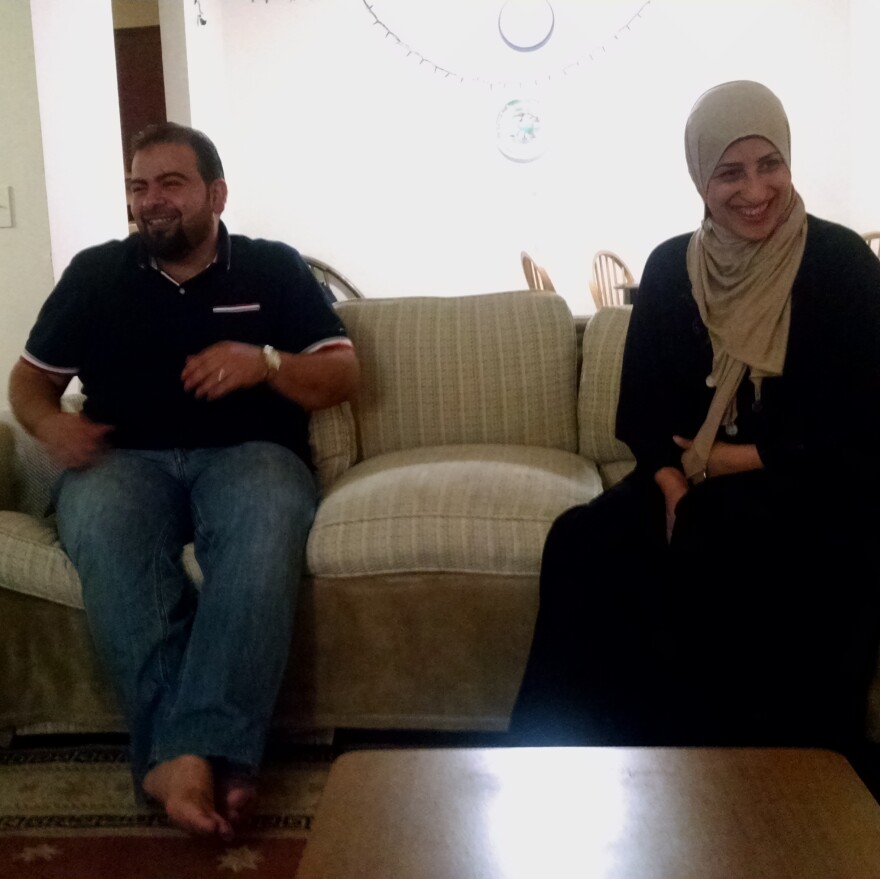While a majority of the nation's governors have asked the Obama administration to stop the resettlement of Syrian refugees in their state, a prominent Tennessee lawmaker has gone a step further: He's suggested the National Guard round up recently arrived refugees and prevent the arrival of additional refugees.
"If I err, it will be on the side of not having another Paris, France," said state Rep. Glen Casada, the chairman of the House Republican Caucus in the state Legislature. "When we let them in, we are letting terrorists in."
"We gather them, we take them back to ICE," said Casada, referring to U.S. Immigration and Customs Enforcement, "we say, 'gentlemen, make sure these guys have no tie to terrorist activity.' "
Refugees resettled in the United States go through an 18- to 24-month vetting process before being allowed into the country.
Casada is also open to putting Syrian refugees under surveillance by state law enforcement authorities. "I think we should not limit our response," he said in an interview.
State Democrats responded strongly at a press conference, where Rep. John Ray Clemmons said "this unethical and irresponsible proposal to utilize military personnel to round up men, women and children should serve to truly shock our state's collective conscience."
Casada's view may be extreme, but many Tennessee Republicans want a halt to refugee resettlement.
Earlier this week, Tennesee Gov. Bill Haslam joined 29 other governors, mostly Republican, who called on the Obama administration to stop the placement of as many as 10,000 Syrian refugees. Still, Haslam joined in the condemnation of Casada's proposal.
"If we abandon our values by completely shutting our doors to those who seek the freedom we enjoy or mistreating our neighbors who made it here after enduring unimaginable hardships, the terrorists win," said Haslam.
A Popular Refugee Destination
The State Department has placed large numbers of refugees in Tennessee since the early 1990s. The state receives more refugees, as a share of population, than New York, California or Illinois, and many are from the Middle East. Still, few are from Syria.
Just 42 Syrian refugees have arrived in Tennessee since 2011 out of 6,890 refugees that were resettled in the state over the same period, according to the Refugee Processing Center. The Syrians are fleeing a four-year civil war that has claimed an estimated 200,000 to 300,000 lives and displaced more than 4 million people.
The number of Syrian refugees in Tennessee is expected to grow to a few hundred over the next year, said Holly Johnson, the state refugee coordinator for Catholic Charities.
"The State Department certainly wants to resettle refugees in communities that will welcome them, and Tennessee has always been that sort of place," she said. "Every community where refugees are resettled welcomed them. I would hope that'd continue to be the case."
Casada's remarks echo in a state where public mistrust of Muslims has regularly bubbled up in recent years.
Some Republican lawmakers have attempted to force the state to revise a middle school history unit that teaches about Islam. In July, a man of Jordanian descent killed five service members at military recruiting centers before being killed by police. Residents of a Tennessee town spent years protesting the construction of a mosque, and some of the state's lawmakers have warned of attempts to impose Islamic law in the state.
A Welcome New Home For One Family
Still, one Syrian refugee who recently arrived in the state said he's only encountered hospitality so far.

Fahed Nakshou, 32, was a barber in the Syrian city of Homs before fighting forced him and his family to flee to Jordan. They spent three years in a border town, just outside the refugee camps. As a refugee, Nakshou said, he is barred from working.
Nakshou said he did not ask to come to the United States and that his family would have been just as happy resettling anywhere far from Syria. International refugee workers forwarded his request for asylum to authorities in the U.S., who placed him in Nashville.
Through a translator, Nakshou explains, that his family didn't choose Nashville and were sent there because they had no family in the U.S.
Nakshou, his wife and their two children, ages 4 and 2, arrived in Nashville in August. He said life is much better in Tennessee. His neighbors along Nolensville Pike, a busy immigrant corridor, include Mexicans, Bhutanese and Burmese — even an American.
He and his wife take English classes four days a week, and the local markets carry items that he hasn't seen since leaving Syria, like long radishes and leeks. Nakshou has talked to a local barber shop about going back to work, but he needs a license. He is awaiting paperwork from his family back in the Middle East that will prove he has experience.
Even before the Paris attacks, Nakshou had little expectation that his extended family would ever join him in Nashville. He is hopeful more Syrians can come and got upset at the thought that other refugees might be barred from entering the U.S.
Still, Nakshou was optimistic that their new home will be more welcoming than their previous one.
Copyright 2020 WPLN. To see more, visit WPLN. 9(MDAyMTYyMTU5MDEyOTc4NzE4ODNmYWEwYQ004))

